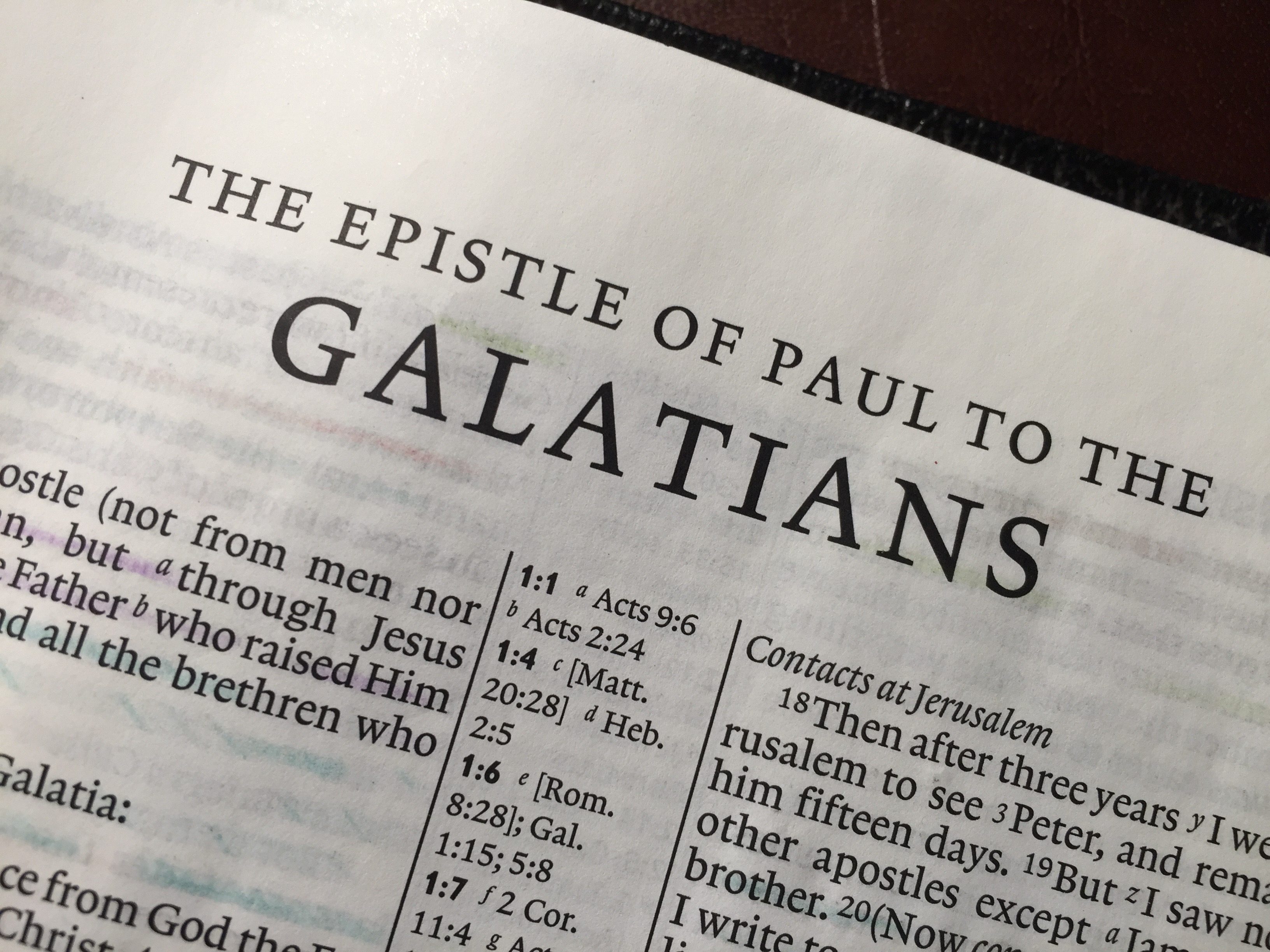What is Paul really saying in his Epistle to the Galatians? Is he advocating the abrogation of the Torah (the law of Moses), or is there another issue he is addressing? What is the larger and loftier message in this amazing epistle? Watch this video to find out.
For the study notes that I used while giving this teaching, go to http://hoshanarabbah.org/blog/2016/09/03/galatians-chapters-4-to-6-explained/.
Tag Archives: Paul
“Eat Pork,” saith your local Xtian pastor, while twisting Scripture
I’m tired of people (especially so-called Christian Bible teachers [who should know better]) twisting the word of Elohim to make it say what they want. It seems that their carnal or fleshly lusts dictate how to interpret the Bible. Their god is their belly, as Paul said elsewhere. The passage below is an example of a scripture they twist in the most illogical way to make it say something that it doesn’t say.
1 Timothy 5:3–5, Foods. Many take this passage to mean that simple “prayer over the food” sanctifies nonkosher food. Were we to take this logic to its illogical conclusion, then we might suppose that prayer over skunk meat, certain poisonous types of frogs, snakes and salamanders as well as poisonous mushrooms would make them edible. Of course, this is ridiculous. Is this really what Paul, the orthodox Jewish Torah scholar, is teaching? Once again, understanding Scripture in its context is essential to obtaining its proper interpretation. These verses read:
Forbidding to marry, and commanding to abstain from meats, which Elohim has created to be received with thanksgiving of them which believe and know the truth. For every creature of Elohim is good, and nothing to be refused, if it be received with thanksgiving, for it is sanctified by the Word of Elohim and prayer. (emphasis added)
What does this passage really say? Does it say that the meat we eat is sanctified (i.e., set aside for special use) only through the act of prayer?
In verse five Paul teaches that the meat we eat is sanctified through prayer and the Word of Elohim. When Paul wrote this letter to Timothy there was no Testimony of Yeshua or New Testament—only the Tanakh or Old Testament. Where in the Tanakh do we find which meats YHVH has set aside or sanctified for man as edible? Leviticus chapter eleven, of course. Furthermore, in verse three above Paul talks about “them which believe and know the truth.” How does Scripture define truth? Yeshua defined truth as the Word of Elohim (namely the Hebrew Scriptures, which is all that existed at that time) (John 17:7). The Tanakh define truth as the Torah-law of YHVH (which contain YHVH’s biblical kosher laws pertaining to clean and unclean meats; see Ps 119:142 and 151).
So when examined in its proper context this passage in 2 Timothy in no way teaches that it is scripturally permissible for believers to indulge in unclean meats. On the contrary, this passage in fact validates the biblical kosher laws as outlined in the Torah and shows clearly, if we let Scripture speak for itself and define its own terms instead of reading into it our own meanings, that the biblical dietary laws are for believers today.
Galatians Chapters 4 to 6 Explained Hebraically
Gal 4:1–5, When we were in the world, we were spiritual slaves to the elements (rudiments or principles) of the world. As worldly sinners (Torah violators, 1 John 3:4), we came under the death penalty, for the wages of sin is death (Rom 6:23). We needed the Torah as a guardian or steward to tell us what sin was and to lead us to repentance and to the Messiah, who came to redeem us from being under the curse or penalty for violating the law, which is sin. This is him showing sinners his grace. If, as the mainstream church teaches, Yeshua came to set us free from the law, so that we no longer have to obey the law, then we are turning the grace of Elohim into lasciviousness (lewdness, licentiousness or licence to sin or to violate the Torah), which as Jude says, only ungodly men do (Jude 4). Or as Paul asks in Romans, do we make the law void through grace? Elohim forbid, may it never be, is his response (Rom 3:31).
Gal 4:8–20, This passage is difficult to understand. Are the “weak and beggarly elements” (v. 9) speaking about “the elements, rudiments or principles of the world” to which Paul makes reference earlier (in v. 3) and to which the Gentiles had been in bondage (v. 3) before coming to salvation—before they knew Elohim (vv. 8–9)? Or are the “weak and beggarly elements” referring to the Torah? The latter interpretation is what the mainstream church teaches; however, this doesn’t seem to be what Paul is saying here. How could the Gentiles return again to something they never had in the first place—which they had done “when you did not know Elohim” as Paul states in verse 8? They never had the Torah before coming to faith in Messiah. They did, however follow the pagan, Torahless customs of the world. This is what the “weak and beggarly elements” are. Not the Torah!
Gal 4:10, Are these days, months seasons and years referring to pagan holidays and observances, which are aspects of the weak and beggarly elements of pagan worship? If so, why should we think it strange that the Galatian believers were still observing pagan holidays? In our day, hasn’t the mainstream church replaced YHVH’s feasts and Sabbath with pagan festivals? On the other hand, the mainstream church teaches that in this verse not only is Paul referring to the biblical feasts and Sabbath, but that he is here abrogating the biblical Sabbath and feasts. Is this the case? If Paul is referring to the biblical feasts and Sabbath, let’s bring into this discussion 1 Corinthians 13—the Bible’s well-known “Love Chapter.” There Paul states that without love, everything a saint does is merely a clanging gong and tinkling cymbal to YHVH. In other words, it means nothing to YHVH. Similarly, if we obey the Torah out of Continue reading
Allusions to Torah-Obedience in the Book of First Thessalonians
The following exercise can be applied to all of the New Testament books including all the other books written by Paul.
Connecting the Gospel to Its Pro-Torah Hebrew Roots
When I was taking a college level biblical Greek class a few years back, the Christian professor and I had a few discussions about the Torah. It was his belief that the epistles in the New Testament contained very few references to the Torah. In his mind, therefore, the Torah wasn’t a very prominent idea in the minds of the apostolic writers. I tried to enlighten him otherwise.
While the epistles might not contain very many outright references to the Torah — especially direct commands to be obedient to the Torah’s standards of righteousness, the apostolic writers weave the fundamental concepts of the Torah through their writings and make countless allusions to the Torah as we shall see in the study below. The Torah was just part of their spiritual and social fabric and background. It was their spiritual foundation, and to them Yeshua the Jewish, Torah-obedient Messiah, who was the Living Word of Elohim incarnate, was simply an extensions or expression of this basic idea of Torah truth and righteousness, and whose example they expected the saints to follow as his disciples.
1 Thess 1:2, Labor of love. (Hard work, intense labor or toil of charitable/agape love, benevolence, good will). Biblically speaking, is love merely an emotion, or is it something more? The Bible presents love as an action. Yeshua said, “If you love me, keep my commandments” (John 14:15). This action involves obedience to YHVH’s Torah-commandments. Elsewhere, Yeshua sums up the Torah when he quotes the biblical shema, which states that the duty of man is to love YHVH with all one’s heart, soul, mind and strength and one’s neighbor as oneself (Mark 12:28–31 cp. Deut 6:4 and Lev 19:18). The shema is a summation of the ten commandments the first four of which show us how to love YHVH, while the last six how to love our neighbor. These ten statements form the foundation or cornerstone of the entire Torah, which expand out of them.
1 Thess 1:9, Turn from idols … serve the living Elohim. The Tanakh (Old Testament) views idolatry as anything that takes one away from worshiping and serving YHVH by obeying his Torah commandments. The biblical prophets were continually warning the Continue reading
New Video: Galatians Chapters 1 to 3 Explained Hebraically
Addressing Paul’s Difficult Words in Colossians 2
Colossians 2:14, Having wiped out. Here Paul mentions that Yeshua blotted out the handwritings of legal decrees that were against us when he died on the cross (Col 2:12–15). What was against us? It was the Torah law that specified that the sin of adultery carried the death penalty (Lev 20:10). For those who are washed in Yeshua’s redeeming blood and have been buried with him by water immersion or baptism (Col 2:12 cp. Rom 6:3–11), the devil, who is the accuser of the brethren (Rev 12:10), no longer has any legal basis against which to lay the charges of the sin of unfaithfulness against us before the Almighty (Col 2:15). Likely, there is a heavenly record of each man’s sins written in one of the books (which are in addition to the book of life) mentioned in Revelation 20:12. These books be opened at the last judgement and will be used to determine one’s eternal rewards based on one’s works of righteousness (v. 12). Some will be granted eternal life, while others will be destroyed in the lake of fire (v. 15). As mentioned, those who are under the blood of Yeshua and whose names are written in the Lamb’s book of life, there is no condemnation.
In this passage, Paul may be alluding to the law of the jealous regarding an unfaithful woman (Num 5:11–31). In this case, the Torah instructs a man to bring his wife whom he suspects of adultery before the priests along with an offering of barley meal. What follows Continue reading




